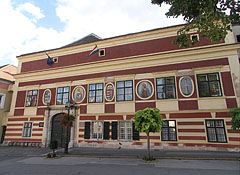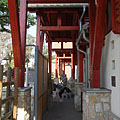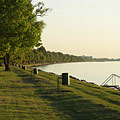 Informations touristiques
Informations touristiques
(Optimisée pour appareils à petit écran)
The Old Town - Kőszeg, Hongrie
Lorsque vous cliquez:
Cliquez sur les images !
-

Date de la photographie: 15-07-20062006
Créé par: Robert Németh
Modèle d'appareil photo: Konica Minolta Dimage A200
Kőszeg, Hongrie
-

Date de la photographie: 15-07-20062006
Créé par: Robert Németh
Modèle d'appareil photo: Konica Minolta Dimage A200
Kőszeg, Hongrie
-

The Heroes' Tower or Heroes' Gate, today it is the Town Museum
It was built in 1932
Date de la photographie: 15-07-20062006
Créé par: Robert Németh
Modèle d'appareil photo: Konica Minolta Dimage A200
Kőszeg, Hongrie
-

Date de la photographie: 15-07-20062006
Créé par: Robert Németh
Modèle d'appareil photo: Konica Minolta Dimage A200
Kőszeg, Hongrie
-

The green ceramic tile-covered spire on the tower of the Sacred Heart Church
Date de la photographie: 15-07-20062006
Créé par: Robert Németh
Modèle d'appareil photo: Konica Minolta Dimage A200
Kőszeg, Hongrie
-

A tower of the Kőszek Castle (or Jurisics Castle)
Date de la photographie: 15-07-20062006
Créé par: Robert Németh
Modèle d'appareil photo: Konica Minolta Dimage A200
Kőszeg, Hongrie
-

Castle of Kőszeg (commonly known as Jurisics Castle)
Date de la photographie: 15-07-20062006
Créé par: Robert Németh
Modèle d'appareil photo: Konica Minolta Dimage A200
Kőszeg, Hongrie
-

Date de la photographie: 15-07-20062006
Créé par: Robert Németh
Modèle d'appareil photo: Konica Minolta Dimage A200
Kőszeg, Hongrie
-

Date de la photographie: 15-07-20062006
Créé par: Robert Németh
Modèle d'appareil photo: Konica Minolta Dimage A200
Kőszeg, Hongrie
-

The 57-meter-high tower or steeple of the Sacred Heart of Jesus Church
Date de la photographie: 15-07-20062006
Créé par: Robert Németh
Modèle d'appareil photo: Konica Minolta Dimage A200
Kőszeg, Hongrie
-
The tower (steeple) of the Sacred Heart of Jesus Church
Date de la photographie: 15-07-20062006
Créé par: Robert Németh
Modèle d'appareil photo: Konica Minolta Dimage A200
Kőszeg, Hongrie
The tower (steeple) of the Sacred Heart of Jesus Church - Kőszeg, Hongrie -
The baroque facade of the yellow St. James' Church
Date de la photographie: 15-07-20062006
Créé par: Robert Németh
Modèle d'appareil photo: Konica Minolta Dimage A200
Kőszeg, Hongrie
The baroque facade of the yellow St. James' Church - Kőszeg, Hongrie -
The Saint James' Church (in Hungarian "Szent Jakab-templom", also known as Old Church) and the slightly higher St. Emeric's Church ("Szent Imre-templom") next to each other
Date de la photographie: 15-07-20062006
Créé par: Robert Németh
Modèle d'appareil photo: Konica Minolta Dimage A200
Kőszeg, Hongrie
The Saint James' Church (in Hungarian "Szent Jakab-templom", also known as Old Church) and the slightly higher St. Emeric's Church ("Szent Imre-templom") next to each other - Kőszeg, Hongrie -
The yellow-painted St. Emeric's Church, and slightly further the Heroes' Gate
Date de la photographie: 15-07-20062006
Créé par: Robert Németh
Modèle d'appareil photo: Konica Minolta Dimage A200
Kőszeg, Hongrie
The yellow-painted St. Emeric's Church, and slightly further the Heroes' Gate - Kőszeg, Hongrie -
The domed well-house of the Town Well
It was built between 1818-1824
Date de la photographie: 15-07-20062006
Créé par: Robert Németh
Modèle d'appareil photo: Konica Minolta Dimage A200
Kőszeg, Hongrie
The domed well-house of the Town Well - Kőszeg, Hongrie -
Town Hall (in Hungarian "Városháza")
Date de la photographie: 15-07-20062006
Créé par: Robert Németh
Modèle d'appareil photo: Konica Minolta Dimage A200
Kőszeg, Hongrie
Town Hall (in Hungarian "Városháza") - Kőszeg, Hongrie -
Date de la photographie: 15-07-20062006
Créé par: Robert Németh
Modèle d'appareil photo: Konica Minolta Dimage A200
Kőszeg, Hongrie
- Kőszeg, Hongrie -
Sacred Heart Church (Church of the Sacred Heart of Jesus)
Date de la photographie: 15-07-20062006
Créé par: Robert Németh
Modèle d'appareil photo: Konica Minolta Dimage A200
Kőszeg, Hongrie
Sacred Heart Church (Church of the Sacred Heart of Jesus) - Kőszeg, Hongrie -
The neo-gothic Sacred Heart Parish Church
Designed by Ludwig Schöne architect from Vienna, built between 1892-1894 in the place of the former Hotel Korona.
Date de la photographie: 15-07-20062006
Créé par: Robert Németh
Modèle d'appareil photo: Konica Minolta Dimage A200
Kőszeg, Hongrie
The neo-gothic Sacred Heart Parish Church - Kőszeg, Hongrie -
Date de la photographie: 15-07-20062006
Créé par: Robert Németh
Modèle d'appareil photo: Konica Minolta Dimage A200
Kőszeg, Hongrie
- Kőszeg, Hongrie -
Medieval suldier figure on the Mihály Hörmann's stone memorial sculpture close to the castle walls
Sculpted by András Kiss Nagy in 1972
Date de la photographie: 15-07-20062006
Créé par: Robert Németh
Modèle d'appareil photo: Konica Minolta Dimage A200
Kőszeg, Hongrie
Medieval suldier figure on the Mihály Hörmann's stone memorial sculpture close to the castle walls - Kőszeg, Hongrie -
Memorial stone (sculpture) of Mihály Hörmann
Created by András Kiss Nagy in 1972
Date de la photographie: 15-07-20062006
Créé par: Robert Németh
Modèle d'appareil photo: Konica Minolta Dimage A200
Kőszeg, Hongrie
Memorial stone (sculpture) of Mihály Hörmann - Kőszeg, Hongrie -
The Jurisics Castle of Kőszeg
Date de la photographie: 15-07-20062006
Créé par: Robert Németh
Modèle d'appareil photo: Konica Minolta Dimage A200
Kőszeg, Hongrie
The Jurisics Castle of Kőszeg - Kőszeg, Hongrie -
The Town Well and the Heroes' Gate on the square
Date de la photographie: 15-07-20062006
Créé par: Robert Németh
Modèle d'appareil photo: Konica Minolta Dimage A200
Kőszeg, Hongrie
The Town Well and the Heroes' Gate on the square - Kőszeg, Hongrie -
St. Emmerich Church ("Szent Imre-templom")
Date de la photographie: 15-07-20062006
Créé par: Robert Németh
Modèle d'appareil photo: Konica Minolta Dimage A200
Kőszeg, Hongrie
St. Emmerich Church ("Szent Imre-templom") - Kőszeg, Hongrie -
Marian Column
Created by Lorenz Eisenköbel master sculptor from Sopron in 1739.
Date de la photographie: 15-07-20062006
Créé par: Robert Németh
Modèle d'appareil photo: Konica Minolta Dimage A200
Kőszeg, Hongrie
Marian Column - Kőszeg, Hongrie -
Heroes' Gate (in Hungarian "Hősök kapuja")
Date de la photographie: 15-07-20062006
Créé par: Robert Németh
Modèle d'appareil photo: Konica Minolta Dimage A200
Kőszeg, Hongrie
Heroes' Gate (in Hungarian "Hősök kapuja") - Kőszeg, Hongrie -
Date de la photographie: 15-07-20062006
Créé par: Robert Németh
Modèle d'appareil photo: Konica Minolta Dimage A200
Kőszeg, Hongrie
- Kőszeg, Hongrie -
Date de la photographie: 15-07-20062006
Créé par: Robert Németh
Modèle d'appareil photo: Konica Minolta Dimage A200
Kőszeg, Hongrie
- Kőszeg, Hongrie -
Date de la photographie: 15-07-20062006
Créé par: Robert Németh
Modèle d'appareil photo: Konica Minolta Dimage A200
Kőszeg, Hongrie
- Kőszeg, Hongrie -
Date de la photographie: 15-07-20062006
Créé par: Robert Németh
Modèle d'appareil photo: Konica Minolta Dimage A200
Kőszeg, Hongrie
- Kőszeg, Hongrie -
Date de la photographie: 15-07-20062006
Créé par: Robert Németh
Modèle d'appareil photo: Konica Minolta Dimage A200
Kőszeg, Hongrie
- Kőszeg, Hongrie -
Date de la photographie: 15-07-20062006
Créé par: Robert Németh
Modèle d'appareil photo: Konica Minolta Dimage A200
Kőszeg, Hongrie
- Kőszeg, Hongrie
Cliquez sur les images !
Caractéristiques, propriétés
Emplacement:
Coordonnées GPS: Actuellement pas disponible
Informations, histoires courtes, faits intéressants
 The baroque facade of the yellow St. James' Church
The baroque facade of the yellow St. James' Church
One of the oldest building of Kőszeg town is the Roman Catholic St. James's Church (in Hungarian "Szent Jakab-templom"), which has baroque style exterior combined with mostly gothic interior. It was built probably on the site of the former Minorite church, which was built in 1246 and destroyed in 1289. It is almost sure that the present-day church was built around 1403-1407 by Nicholas II Garay (Garai Miklós II) Palatine of Hungary and Ban of Croatia, Dalmatia and Slavonia, after the battered old church was demolished. Initially the three-nave gothic hall church probably had a tower as well, but not much resources preserved about it. The main feature of the hall churches is that their nave and the aisles (so the interior spaces) are in the same high, in contrast with the basilical layout where the nave is always higher than the aisles.
There are marks of religious conflicts, skirmishes and also conflagrations on many part of the building. For example a lot of beautiful furnitures were destroyed in the course of time.
 Town Hall (in Hungarian "Városháza")
Town Hall (in Hungarian "Városháza")
The Town Hall of Kőszeg is the only such building in Hungary, which public office function didn't change in the last 600 years (so it means it is Town Hall since 600 years ago).
 The Heroes' Tower or Heroes' Gate, today it is the Town Museum
The Heroes' Tower or Heroes' Gate, today it is the Town Museum
It was built in 1932
The Heroes' Gate or Heroes' Tower of Kőszeg (in Hungarian "Hősök kapuja" or "Hősök tornya") was built on the site of the former southern town gate in 1932, for exactly the 400th anniversary of the siege of the Ottoman troops of 1532. The southern gate (the so-called Lower Gate) of the town was demolished in 1880, because it was in very bad condition.
 Medieval suldier figure on the Mihály Hörmann's stone memorial sculpture close to the castle walls
Medieval suldier figure on the Mihály Hörmann's stone memorial sculpture close to the castle walls
Sculpted by András Kiss Nagy in 1972
Mihály Hörmann was a Hungarian historical figure, but there are several explanations for his real identity. One explanation is that Hörmann or Hermann was a councilor and a minor character in the siege of Kőszeg in 1532. According to the legend he proposed to punish the betrayers of the town more strictly (namely to flay them alive), but he himself became a traitor instead. The councilor entered into collusion with the Ottomans, and due to this he was executed close to the spring that was later named after him and in the manner as he suggested earlier.
The other explanation puts Mihály Hörmann in later times and into completely different context. According to this in the early-1620s he was the captain of the Kőszeg Castle by the commission of Prince Gábor Bethlen. But at the Hörmann Spring the commander was captured by Habsburg soldiers, who then skinned him alive. Allegedly his skin was shown in the Town Hall for centuries.
Of course the statue commemorates the positive person of the latter legend. One way or another, both stories are really brutal and morbid, hopefully once it turns out that none of them was true (albeit there are many similar examples of such human cruelty in the history of mankind).
 Marian Column
Marian Column
Created by Lorenz Eisenköbel master sculptor from Sopron in 1739.
The Marian Column in the medieval main square of Kőszeg was erected by the town in 1739 with a high degree of cynicism. In fact, the Protestant believers protested against the Marian cult of the Roman Catholics. Despite it, or rather exactly that's why the work of the sculptor was paid from the fines collected from the Protestants.
Vous pourriez aussi être intéressé par (Pages connexes):
Destinations, emplacements dans le guide de voyage:
Kőszeg (33 photos + 1 photos panoramiques)
Alpokalja (230 photos + 1 photos panoramiques)
Vas megye (county) (499 photos + 5 photos panoramiques)
Ouest de la Hongrie (985 photos + 10 photos panoramiques)
Hongrie (27 287 photos + 163 photos panoramiques)
et en plus:
(au sein ici: Vas megye et Alpokalja)
Parc national du Őrség (83 photos)
Ják
Kám (99 photos)
Körmend (117 photos)
Sárvár (79 photos + 3 photos panoramiques)
Szentgotthárd (8 photos)
Körmend (117 photos)
Szombathely (23 photos)
Szombathely (23 photos)
Bükfürdő (65 photos + 1 photos panoramiques)
Sopron (57 photos)
Chaque photo panoramique à:
Kőszeg (1 photos)
Vas megye (county) (5 photos)
Ouest de la Hongrie (10 photos)
Hongrie (163 photos)
Europe (165 photos)
Toutes les photos normales à:
Kőszeg (33 photos)
Alpokalja (230 photos / 6 galerie)
Vas megye (county) (499 photos / 13 galerie)
Ouest de la Hongrie (985 photos / 27 galerie)
Hongrie (27 287 photos / 462 galerie)
Europe (30 494 photos / 523 galerie)
https://www.panadea.com/fr/guidebook/koszeg/photos/gal-001

Ajouter aux Favoris Ajouter aux Signets
Partagez avec vos amis!
etc.
Notre guide touristique contient:
De nombreuses photos et des images panoramiques, avec beaucoup d'informations et de faits intéressants.
- 214 destinations de voyage
- 165 photos panoramiques
- 30 494 autres photos
Grande collection de photos sélectionnées: excellente qualité, à haute résolution et des couleurs naturelles
Qui sommes nous - Avertissement légal & Avis juridique -
Tous droits réservés
- ©2010-2022
Neuronit Creative Studio - Mogyoród / Budapest / Hongrie




